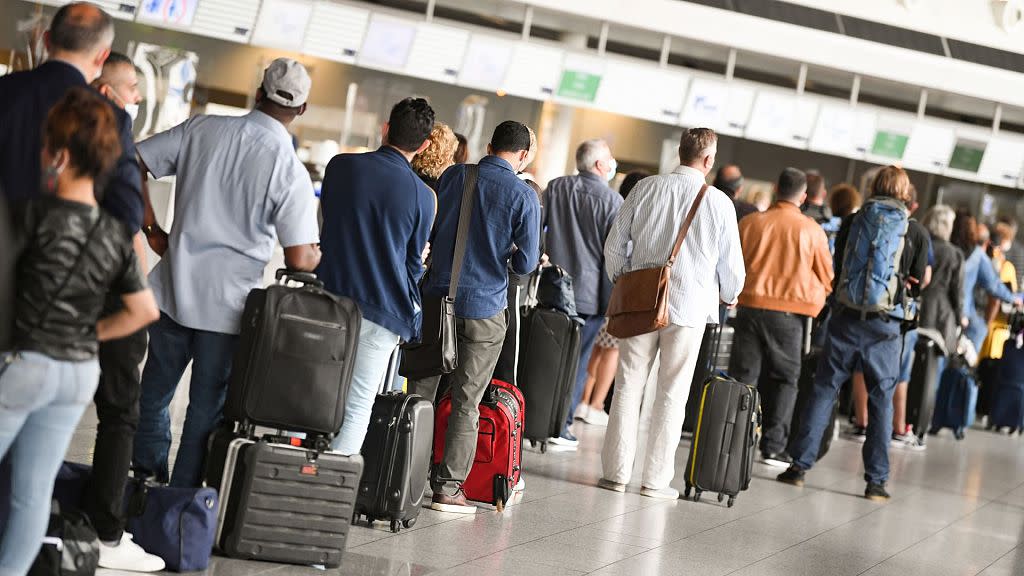‘Bad for tourism’: Why travel agents say the new EU Entry/Exit system could be delayed again

After being delayed for years, the EU’s Entry/Exit System (EES) is expected to come into force this autumn.
Brits and other ‘third-country’ holidaymakers will need to register their arrival and departure from EU and Schengen Area countries by having their photo and fingerprints taken at passport control. This will replace the manual passport stamp.
But many travellers remain uncertain about how the system - and the follow up European Travel Information and Authorisation System (ETIAS) due in mid-2025 - will work.
Euronews Travel spoke to travel bodies, agents and experts to find out what advice they are giving their customers ahead of the slated launch.
Travel agents are uncertain about the EES launch date
A number of major travel agents told Euronews Travel that they are yet to receive questions or official guidance on the EES scheme.
But travel trade association ABTA has already published tips and advice for planning and booking a holiday under the new system.
Despite reports that the scheme is set to come into force on 5 October 2024, an ABTA spokesperson emphasised that the exact launch dates for both EES and ETIAS have not yet been confirmed.
This uncertainty has led to scepticism among some travel agents.
“We are giving no advice at all as we are waiting to see if the scheme actually goes ahead,” says Noel Josephides, chairman of UK travel agent Sunvil.
Likely due to a lack of awareness among the public, he says Sunvil has only received one comment on the scheme from a client who said he was “fed up” with regulations and “would not travel in Europe again”.
Why I’m racing to get my French citizenship before the EU’s Entry/Exit System launches in October
Albania, Cyprus, Ireland: Europe’s best non-Schengen countries for when you’ve used up your 90 days
Will EES put travellers off trips to Europe?
“The more bureaucracy the worse it will be for travel freedoms,” says Josephides, who agrees that schemes like the EES are likely to put people off travelling to Europe.
He points to Olympics-led delays to the launch as proof the scheme is expected to be disruptive for travellers.
“Whenever they launch it, it will be bad for tourism and will complicate travel, otherwise France would have accepted its introduction before the Olympics in France this summer.”
He’s not the only one who is concerned about the impact of EES on travellers.
In April, P&O Ferries raised concerns about the implementation of the scheme at the Port of Dover.
“The EES process was designed for pedestrian passengers passing through an airport, and is fundamentally unsuited for a port environment,” the company’s European Operations Director, Jack Steer, wrote in a letter to UK Parliament.
He said that, with the current layout of the port making it impossible to separate passenger and freight traffic for processing, “serious disruption” would be unavoidable.
How will EES affect ferries?
EES checks for flight passengers will generally be completed on arrival at your destination. But for ferry journeys from the Port of Dover and international trains, they will take place when going through passport control in the UK, ABTA explains. This is due to the dual British-French borders at these locations.
Concerns over delays at the port likely factored into the latest launch delay, which will give the Port of Dover time to implement new processing systems for cars and coaches. This will include kiosks and holding areas located outside of the port itself to reduce queues at the border.
An app to help speed up the registration process is not expected to be ready in time for autumn, and travel delays are still likely.
“EES is an EU initiative, but the UK Government is working closely with the European Commission, its member states, local authorities in the UK and industry to minimise any disruption to people’s travel plans,” a spokesperson from the UK’s Department for Transport (DfT) tells Euronews Travel.
“This includes working closely with ports, carriers and the travel industry to ensure they are supported and equipped to communicate the changes and any potential impact it may have on people’s travel.”
How will ESS affect international trains?
Eurostar is expanding its London base at St Pancras station to fit in more kiosks to process EES data.
With train tickets often cheaper in advance, rail passengers are already wondering how EES will affect their travels.
Flight-free travel company Byway has already received questions from clients about when the scheme will be implemented, whether they’ll require visas and what documentation will be needed.
“Flight-free travel can feel quite complex to plan on your own anyway,” says Byway’s CEO and founder, Cat Jones. “A lot of these systems tend to be built with air travel in mind, which can make it difficult to find information specifically for train travel.”
One client has already said they’ll be returning to book with the company as they want help when navigating the new system.
Due to a lack of awareness among the British public about how EES and ETIAS will work, it’s likely that many will rely on travel agents to guide them when the schemes finally do come into play.


